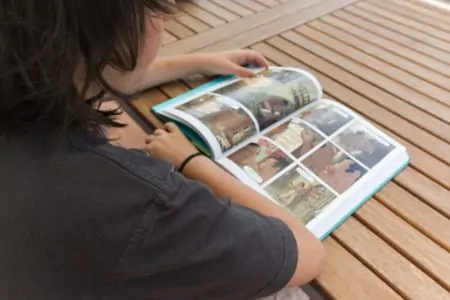Bedtime battles are real, but the right story can turn a chaotic evening into a peaceful, bonding moment. Whether you are looking to soothe a toddler or entertain a grade-schooler, a good tale settles the mind and sparks the imagination before sleep takes over.
We have gathered 12 magical stories for kids, ranging from ancient folktales to funny fables. These aren’t just for entertainment; they teach kindness, honesty, and courage while helping your little one drift off to dreamland.
Bedtime Stories for Kids
Whether you need something cute, funny, or a little fantastical, these stories deliver the perfect end to the day.
Callista And The Puma
This Argentine folktale follows a young girl, her unlikely friendship with a wild puma, and how nature repays kindness.
Once there was a girl named Callista. Her father was a Spanish soldier, and after Spain invaded South America, she moved to Argentina with her family.
The locals were angry that the Spanish had taken over their land. To force the invaders out, they surrounded the camp where the Spanish families lived, cutting off their supplies.
Callista was warned never to leave the camp, but her hunger grew too strong. One day, she snuck out into the wild to find food.
As she explored the jungle, she discovered a cave where a mother puma had just given birth. Instead of running away, Callista helped the exhausted mother clean the cubs and found food for her to eat.
Eventually, the native people found Callista. She was terrified, but they did not harm her. Instead, they took her to their village, fed her, and cared for her. Callista felt loved and lived happily among them for a long time.
Then, the Spanish soldiers attacked the village. They captured Callista and dragged her back to the camp. Her father was furious she had run away and ordered soldiers to tie her to a tree in the jungle as punishment. She was left there alone for days.
The villagers wanted to save her, but they feared the Spanish soldiers. After three days, they finally crept into the trees, expecting the worst. But when they arrived, Callista was safe.
The puma she had cared for had returned to stand guard and protect her.
Amazed, the villagers untied Callista and took her home, where she lived a long, happy life.
The Unexpected Rock
told by the Miwok tribe of Yosemite, this story explains how the massive El Capitan rock formation grew out of the earth overnight.
One day, two children were playing in a stream. When they climbed out, they felt chilly, but the girl spotted a soft, mossy stone bathing in the sunlight.
“Let’s sit there,” she said. “It will be warm in the sun.”
The children lay on the moss and drifted into a deep sleep. As they slept, the rock began to grow. It inched upward, rising higher and higher to keep them close to the warm sun. The children were so comfortable that they didn’t wake up.
By dinner time, the children’s family was searching everywhere.
Finally, Coyote sniffed the ground, followed their trail, and looked up. “They must be on top of this new giant rock,” he said.
Antelope was the best jumper, so the family asked him to rescue the children. He leaped with all his might, but he could only reach a short way up the sheer cliff.
Grizzly Bear was the best climber, so she tried next. She scrambled up the stone but could only reach a little higher than Antelope.
Every animal tried; Jackrabbit, Raccoon, and even Mountain Lion gave it their best shot, but the children remained out of reach.
“Let me try,” said the Inchworm. The other animals laughed.
“You are too small,” they scoffed. “How could you possibly do what the mighty bear and lion couldn’t?”
But the children’s family begged him to try.
Slowly, steadily, the Inchworm crawled past the point Antelope reached. Then he passed Grizzly Bear’s mark. He kept going, inch by inch, until he finally reached the top. He gently woke the children and guided them safely down the mountain.
From that day on, the Miwok called the rock Tutokanula in honor of the Inchworm, proving that even the smallest creature can achieve great things.
The Reward
This cautionary tale from India warns against greed and shows how honesty is the best policy.
There once was an emperor named Akbar. While hunting in the woods, he lost his way as the sun began to set. A young boy named Mahesh heard the emperor calling for help, ran into the jungle, and guided him back to the palace.
Grateful, the emperor took a ring from his finger and gave it to Mahesh.
“Bring this ring to the palace in the morning,” said the emperor. “Show it to the guards and tell them to let you in so I can reward your kindness.”
The next day, Mahesh arrived at the gates. He showed the ring to the guard and asked to see the emperor. But the guard was a greedy man.
“I will only let you in if you promise to give me half of your reward,” the guard sneered.
Mahesh agreed and went inside.
“What would you like as a reward?” the emperor asked.
“I would like 50 lashes,” Mahesh replied calmly.
The emperor was shocked and tried to talk him out of it, but Mahesh insisted. After the 25th lash, Mahesh shouted, “Stop!”
He explained the deal he had made with the greedy guard at the gate.
Furious, the emperor summoned the guard. He gave him the remaining 25 lashes and fired him on the spot.
The emperor turned back to Mahesh. “Now, what would you really like?”
“I promised the guard half of everything,” Mahesh said with a smile. “Since he got his half, I do not need anything else.”
Impressed by the boy’s wit and honesty, the emperor gave Mahesh’s family a new home and enough gold to live happily forever.
The Mermaid’s Ring
A Scottish fairy tale, The Mermaid’s Ring teaches us that sometimes what we think we want isn’t what we actually need.
A young fisherman accidentally caught a mermaid in his net. Legends say if you catch a mermaid and let her go, she must grant you a wish.
“I wish the girl I like would love me forever,” he said.
“Why do you like her?” asked the mermaid.
“Because she is the prettiest girl in the land.”
The mermaid thought for a moment and handed the boy a magical ring.
“Give this ring to the girl you want to marry,” she said. “But you must wait one full year from today before it will work.”
The boy took the ring. On his way home, he passed a homeless girl.
“Please, sir,” she said. “Can you spare something to eat? I will work for you in return.”
The boy didn’t have much, but he agreed to share his dinner if she helped him put away his nets. They ate together, and the girl left, while the boy crawled into bed and dreamed of his crush.
Every day for a month, the girl helped him with the nets, and he shared his food. Then one day, she wasn’t there. Worried, the boy went looking for her and found her asleep in his cold fishing shed.
Ashamed that he had never asked where she slept, he woke her up. He let her sleep by his fire and built a small room onto his house for her.
“You can stay here for the next 11 months,” he told her. “But then my wife will move in, and you will have to leave.”
The next day, the girl wasn’t waiting at the nets. Angry, he stormed home.
“I gave her food and a room,” he grumbled, “and this is how she repays me?”
He burst through his front door and froze. His little home had never been so clean. The bed was made, wood was chopped, and a pot of stew bubbled over the fire.
Again, the boy felt ashamed. The girl had worked hard all day to make his home beautiful.
As months passed, they fell into a routine. They would talk every night before sleep, sharing stories and laughs. Yet, the boy still spoke of his love for the pretty girl in the village.
Then one morning, the boy awoke to find the girl waiting by the door with her bags packed.
“What are you doing?” he asked.
“It is time for you to marry your love,” she said softly. “So I must go.”
The boy hadn’t realized a full year had passed. He grabbed the ring and ran to the village. When he found his “true love,” he saw that she looked exactly the same, but he felt nothing.
He sprinted back home and chased after the girl who had shared his life for the past year.
“Did you find your love?” she asked.
“Yes and no,” said the boy. “I found an ordinary girl in the village. But now that I am with you, I know I have found my real love.”
He gave the girl the ring, and they spent the rest of their lives happily together.
A Tale Of Māui
Māui is a legendary trickster in Polynesian mythology. His adventures were often mischievous, but his goal was always to help his people.
Māui was curious and wanted to know the secret source of fire. He decided that if he extinguished all the fires in the village, he would see how they were relit.
Māui’s mother was the village leader. “Someone must go and ask Mahuika, the goddess of fire, for more,” she announced.
So Māui, who was Mahuika’s grandson, volunteered. He traveled to her cave inside a burning mountain. When he asked for fire, Mahuika pulled off one of her burning fingernails and gave it to him.
But the mischievous Māui walked away, put the fire out, and returned to ask for another. He did this over and over until Mahuika had used all her fingernails and had only one toenail left.
Realizing she was being tricked, Mahuika became furious. She threw her last burning toenail at Māui to destroy him. Māui called on the weather god, who sent rain to put out the flames.
The toenail missed Māui and landed in the Mahoe, Tōtara, Patete, Pukatea, and Kaikōmako trees. These trees caught the fire and held it deep within their wood as a gift from the gods.
Māui took dry branches from these trees back to the village. He showed the people how to rub the wood together to release the hidden fire.
And that is how people discovered the secret of making fire.
The Emperor’s New Clothes
Hans Christian Andersen wrote this famous Danish fairy tale about vanity, peer pressure, and the courage to speak the truth.
There was once an emperor who ignored his duties. He only cared about living in a fancy palace, eating the richest food, and wearing the most beautiful clothes.
One day, two swindlers arrived in the land. They told the emperor they could weave the finest cloth in the world. But this was no ordinary fabric; it was magical. Only smart, brilliant people could see it. To anyone who was stupid or unfit for their job, the cloth would be invisible.
When the swindlers showed the “cloth” to the emperor, he saw nothing but empty air. He was terrified.
“If I say I can’t see it, people will think I am stupid,” he thought. “They will replace me with a new emperor.”
So, he lied. He told the men it was the most magnificent fabric he had ever seen and ordered an entire outfit for the grand parade.
On the day of the parade, the whole kingdom gathered to watch. Everyone had heard about the magical cloth, and no one wanted to admit they couldn’t see it.
The parade began, and the emperor strutted down the street. The crowd cheered and praised his beautiful outfit, though they saw only his bare skin.
Suddenly, a small child pointed and shouted, “Why isn’t he wearing any clothes?”
The truth broke the spell. People started giggling, then whispering, and finally shouting. The emperor realized he had been tricked. But he was too proud to stop, so he held his head high and finished the parade, naked as the day he was born.
You Need A Lion’s Whisker
This Ethiopian folktale reminds us that relationships take time. Patience and perseverance can solve problems that force cannot.
Leeya married a man who already had a young son. She tried desperately to bond with the boy, but he ignored her. Frustrated, Leeya visited a medicine man in the mountains.
“Please help me,” she begged. “I want to be friends with my stepson, but nothing works.”
“I can make a potion,” the medicine man said. “But first, you must bring me a whisker plucked from a living lion.”
Leeya was terrified, but her desire to have a happy family was stronger than her fear. She went to the plains where the lions lived.
Every day for a month, Leeya placed a bowl of meat near a lion’s den and watched from behind a rock.
The next month, she did the same, but she knelt in plain sight. The following month, she stood closer.
For six months, she inched nearer to the beast. By the tenth month, she stood right next to him while he ate. Finally, in the twelfth month, the lion trusted her enough to let her stroke his face.
Gently, she plucked a single whisker and ran back to the medicine man.
He took the hard-won whisker and threw it into the fire.
“Why did you do that?” Leeya cried. “I worked for a whole year to get that!”
“You learned how to approach a wild lion,” the medicine man replied gently. “You were patient, you fed him, and you gained his trust over time. Is it any harder to do the same for a young boy who misses his mother?”
Leeya understood. There were no magic shortcuts. Patience, love, and time would give her the family she wanted.
Swapping Places
This ancient tale is still relevant today. It teaches us to appreciate the hard work others do, even if it looks easy from the outside.
Long ago, a husband and wife lived on a farm. The man worked in the fields all day, while the woman managed the house and children.
One evening, the farmer came home grumpy. “The house is messy, the baby is crying, and there is no butter!” he complained. “I could do a better job in one day than you do all week.”
“Fine,” said his wife. “Tomorrow, I will work the fields, and you will manage the house.”
The next morning, the woman left early for the fields. The man started his day confidently. He fed the chickens and began churning milk for butter.
Suddenly, the baby started crying. He ran to soothe the child, but as he did, their toddler knocked over the butter churn, spilling milk everywhere.
While cleaning the milk, he realized he hadn’t made breakfast. He started cooking but forgot he had left the back door open. The chickens wandered inside, leaving feathers and poop all over the clean floor.
It was chaos. Every time he fixed one problem, two more appeared.
When the woman returned, she found a disaster zone. The house was covered in feathers, the children were dirty and hungry, and her husband was sitting on the bed, looking defeated.
“I am sorry,” he said. “I had no idea how much you juggle every day. I will never complain again.”
And he didn’t. From that day on, he helped with the cooking and childcare, grateful for the partnership they shared.
Growing For A King
This Chinese story is an excellent way to talk to kids about honesty, integrity, and the pressure to succeed.
An old king had no children, so he held a competition to choose the next leader.
He announced that every child in the kingdom would receive a seed. They had to nurture it for one year. The child with the best plant would become the new heir.
A girl named Heng entered the contest. She took her seed home, planted it in the best soil, and watered it carefully.
After a month, other children boasted about their tiny sprouts. Heng’s pot remained empty. By the third month, other children had bushy green plants, but Heng still had nothing.
They teased her, telling her she would never be queen because she couldn’t even grow a weed.
Heng didn’t give up. She changed the soil. She moved the pot to catch more sun. She tried everything, but by the end of the year, her pot was still full of dirt and nothing else.
On the final day, children marched to the palace with lush, beautiful plants. Some even had flowers and fruit. Heng sat at home crying, but her parents told her to be proud of her honest effort.
She carried her empty pot to the palace. The king walked down the line of magnificent greenery, looking unimpressed. Then he stopped at Heng.
“Where is your plant?” he asked.
Heng trembled. “I worked very hard,” she said. “I watered it and kept it warm. But nothing I did could make the seed grow.”
The king smiled. “That is because I gave everyone boiled seeds. Boiled seeds cannot grow.”
He turned to the crowd. “You all replaced your seeds to fake your success. Heng is the only child honest enough to admit failure. That honesty makes her your new leader.”
The Stonemason’s Wish
A story about contentment. It reminds us to be careful what we wish for and to value who we are.
There was once a stonemason who hated his job.
“I wish I were the king,” he grumbled. Suddenly, poof, he was the king.
But he soon found that being king was hard. People always asked him for things, and he had no privacy. He looked up at the sun burning down on him.
“I wish I were the sun,” he said. “The sun is powerful and answers to no one.”
Suddenly, he was the sun. He shone brightly, but soon a rain cloud moved in and blocked his light.
“I wish I were a rain cloud,” he said. “They are more powerful than the sun.”
He became a cloud, pouring rain down on the earth. He flooded fields and villages, but he noticed a giant rock that remained unchanged no matter how much it rained.
“I wish I were a rock,” he said. “Nothing can move a rock.”
He became the stone. He felt strong and immovable until he felt a sharp chip, chip, chip at his feet. It was a stonemason with a chisel, easily shaping the rock.
“I wish I were a stonemason,” he said.
Suddenly, he was himself again, holding his chisel. He realized he had the power to change the world with his own hands, and that was enough.
Mousey Merchant
This Indian tale is a classic underdog story. It shows how clever trading and hard work can turn a “dead mouse” into a fortune.
In a busy city lived a wealthy but mean merchant. A poor boy named Mousey asked him for a loan to start a business.
“You have no money and no skills,” the merchant laughed. He pointed to a dead mouse on the floor. “Here, take this mouse. That is the only capital I will give you.”
Mousey didn’t get angry. He picked up the mouse. Walking down the street, he met a shopkeeper whose cat was hungry. He traded the mouse for two handfuls of chickpeas.
He ground the chickpeas into flour, filled a jar with water, and waited by a road where woodcutters worked. They were tired and thirsty, so Mousey gave them the food and water. In return, they gave him two pieces of wood.
He sold the wood and bought more chickpeas. The next day, he fed the woodcutters again and received more wood.
He did this for months. When the rainy season came, wood was scarce in the city. Mousey sold his stockpile for a high price and bought a small shop.
Years passed, and Mousey became a successful businessman known for his kindness.
One day, he visited the mean merchant. He handed him a small box made of solid gold. Inside was a tiny golden mouse.
“I am repaying my loan,” Mousey said. “With interest.”
Pumpkin In A Jar
This story highlights creative problem-solving and teaches kids that even “impossible” problems have solutions.
A troll lived under a bridge, capturing travelers and forcing them to clean his messy cave. One day, he grabbed a clever girl.
“You must challenge me to an impossible task,” the girl said. “If I complete it, you must let me go. Those are the rules of magic.”
The troll smirked and handed her a glass jar with a narrow neck.
“Here is your task,” he said. “You must grow a full-sized pumpkin inside this jar. The pumpkin must be whole, and you cannot break or cut the glass.”
He thought he had won, but the girl smiled. She took the jar to a pumpkin patch. She found a tiny pumpkin flower that had just been pollinated. Carefully, she slipped the flower inside the jar while it was still attached to the vine.
She left the jar in the field. Over the weeks, the pumpkin grew inside the glass, getting bigger and bigger until it filled the entire space.
When autumn arrived, she cut the vine and brought the jar back to the troll.
The pumpkin was huge, trapped perfectly inside the undamaged glass. The troll was furious, but a deal was a deal. He had to let her go.
The girl returned to her village and taught everyone her trick. The troll, realizing he could be outsmarted, never bothered the villagers again.
Why Bedtime Stories Matter
Reading to a child is about more than just getting them to sleep. It’s a developmental superpower.
It Builds Bonds
In our busy lives, bedtime might be the only time you offer your child 100% of your focused attention. No phones, no chores, just you and them. This builds a sense of security and love that lasts a lifetime.
It Promotes Literacy
Sharing a bedtime storybook introduces the joy of reading early on. Kids who are read to associate books with comfort and parental love, making them more likely to become avid readers themselves.
It Develops Language
Books use words we don’t often use in daily conversation (like “emperor,” “swindler,” or “stonemason”). Listening to stories expands your child’s vocabulary and teaches them complex sentence structures without them even realizing it.
It Sparks Imagination
TV provides the visuals, but stories force the brain to create the pictures. This strengthens the imagination and encourages creative thinking.
How to Tell a Great Story
You don’t need to be an actor to be a great storyteller. Here are a few tricks to make the stories come alive:
Use funny voices: Give the troll a gravelly voice and the mouse a squeaky one. It keeps kids engaged.
Ask questions: Pause and ask, “What do you think will happen next?” or “Why was the lion angry?”
Vary your volume: Whisper during the scary parts and get louder during the exciting moments.
Make it personal: Change the main character’s name to your child’s name occasionally to put them in the adventure.
FAQs
And So To Sleep
Spending those quiet moments sharing a story is the perfect way to close the day. It settles the energy in the house and fills your child’s mind with positive thoughts before they drift off.
Years from now, they won’t remember the messy house or the busy schedule, but they will remember the sound of your voice and the safety they felt listening to these tales. Sweet dreams!


















